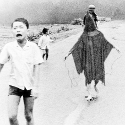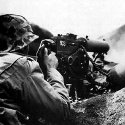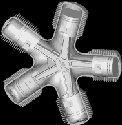|
Spartan421 posted:Landing in Denmark would have gotten them farther away from British soil than the 20 miles or so to Normandy. I was suggesting that the Brits would want to attack and push back the Germans where they were closest to British soil. Landing in Denmark would have left numerous German airstrips within air raid distance to Britain.
|
|
|
|

|
| # ? Apr 26, 2024 20:54 |
|
Mr Havafap posted:Huh? What? Britain and France "declared war" and did nothing. Poland was invaded September 1st 1939 while USSR invaded September 17th. Poland slowly withdraw their foward lines and concentrated their defense in the Romanian Bridgehead giving time for Britian and French to send troops. Poland was eventually captured and split up on October 6-8, with Britain and France not sending a single troop towards Germany. What kind of ally is that then? http://en.wikipedia.org/wiki/Phoney_War "According to the Franco-Polish military convention, the French Army was to start preparations for the major offensive three days after the mobilisation started. The French forces were to effectively gain control over the area between the French border and the German lines and to probe the German defences. On the 15th day of the mobilisation (that is on September 16), the French Army was to start a full scale assault on Germany. The pre-emptive mobilisation was started in France on August 26, and on September 1, the full mobilisation was declared. A French offensive in the Rhine river valley area (Saar Offensive) started on September 7. Eleven French divisions (out of 102 being mobilized) advanced along a 32 km line near Saarbrücken with negligible German opposition. However, the half-hearted offensive was halted after France seized the Warndt Forest, three square miles of heavily-mined German territory. At the same time the U.K., who promised to start air-raids on German industry as soon as possible.[citation needed], conducted a number of air raids against the German Kriegsmarine on September 4, 1939, losing 2 Wellington and 5 Blenheim bombers in the action.[27][28] During those first days of the war Royal Air Force Whitley night bombers also dropped propaganda leaflets on German cities, taking great care to ensure that the leaflets were not dropped tied together so that they would not harm anyone on the ground." That is not even addressing Yalta... when UK/US ignored poland (poland was not even invited) and poland was given up to the USSR. http://en.wikipedia.org/wiki/Western_betrayal#Yalta President George W. Bush described the Yalta negotiations as an "attempt to sacrifice freedom for the sake of stability", and that "when powerful governments negotiated, the freedom of small nations was somehow expendable." OP, can you talk about USSR's involvement in the Warsaw Uprising of 1944 & Aftermath? I think it is very noteworthy and i am surprised you haven't mentioned it yet.
|
|
|
|
Stryfe posted:President George W. Bush described the Yalta negotiations as an "attempt to sacrifice freedom for the sake of stability", and that "when powerful governments negotiated, the freedom of small nations was somehow expendable." What the hell does W have to do with any of this? I'm not trying to derail this thread, but your quote seems ridiculously out of place.
|
|
|
|
vacation in kabul posted:What the hell does W have to do with any of this? I'm not trying to derail this thread, but your quote seems ridiculously out of place. He said that a couple years back on the anniversary of the Yalta Conference, basically as a good will gesture to countries like Lithuania and other Baltic states who just joined NATO.
|
|
|
|
Stryfe posted:That is not even addressing Yalta... when UK/US ignored poland (poland was not even invited) and poland was given up to the USSR. http://en.wikipedia.org/wiki/Western_betrayal#Yalta Sometimes, sacrifices have to be made. There were other more important wartime considerations than the fate of Poland.
|
|
|
|
As a (novice) fan of military history, this is one of the best threads I've seen in Ask/Tell. I think I've even read a few of the same books you have, if your lines about the battles of Trasimene and Cannae are any indication. My interest in history is very broad, so I apologize if the following topics are kind of all over the place. My first question is, just how successful were the Mongols in Europe? I know next to nothing about the matter, but I always thought that Europe doesn't get enough credit for what it was in the Middle Ages, and I have doubts that the Mongols were able to steamroll them as easily as is often claimed. I'm not sure how to phrase this next one without being too vague, so I'll just ask if you can recommend any books on the matter. I'm really interested in the Dark Ages of Europe, especially English, Byzantine, and Scandinavian military organization and tactics. If you can suggest any books on any of those, I would be much obliged.
|
|
|
|
Jabarto posted:
They were successful, it's just that there were richer lands farther afield. Also, because of Genghis Khan's death, the warriors had to go elect a new khan. The Europeans were hopelessly divided along political lines. Edit: Before the Mongols, there were the Huns, and the Avars. In China, you had many similar incursions. The horsemen of the steppes and Siberia were some of the most successful warriors, when they had strong rulers to unite them for attack. The Tartars and nomads in Central Asia constantly harassed Russians for centuries, not to mention the colonists who began to populate Siberia later in the 16th and 17th centuries. Gunpowder eventually won the day though, although the Crimean Tartars weren't absorbed into Russia until the late 18th century. Chade Johnson fucked around with this message at 03:48 on May 6, 2010 |
|
|
|
Frackmire posted:He said that a couple years back on the anniversary of the Yalta Conference, basically as a good will gesture to countries like Lithuania and other Baltic states who just joined NATO.
|
|
|
|
a few people posted:Why were firearms adopted by Europeans more quickly than by the Chinese, even though gunpowder was invented in China? Well, if we go the Victor Davis Hanson route, it's obviously because Europeans have a superior culture! Sarcasm aside, this answer has been assumed by many historians, both professional and amateur, for a very long time. Interestingly enough, the first analysis to really blow this cultural explanation out of the water was done by a lawyer, not an historian. In Firearms: A Global History to 1700, Kenneth Chase provides a clear explanation of how geography was in fact the primary agent in the rejection of firearms by the Chinese, as opposed to their acceptance by Europeans. Quite frankly, I find that this single book does such an excellent job of explaining this course of events, I'll only give a brief synopsis plus the recommendation that everyone read this book. It provides a really great framework for understanding how geography plays a major role in all history, which is why I happen to think that geography should be given way more attention in public schools. Anyway, here's the short version. China has existed in one form or another for about 3,000 years, and for much of that time it faced an implacable foe: the nomadic tribes of Central Asia. These tribes, such as the Mongols, were a constant threat to China's Northern and Western frontiers. This was a primary reason for China's lack of overseas expansion, as they were constantly looking over their shoulder at these troublesome territories. It was no coincidence that China's only period of naval expansion occured during the Yuan Dynasty, which was itself Mongolian. (Since they were Mongolians themselves, they did not need to worry about the Mongolians.) The rest of the time, the Chinese had to concentrate their defense efforts on confronting these nomadic tribes. Now, if you were Chinese, how would you defend against wandering bands of barbarian cavalry? That's right, you would build a Great Wall! This is especially wise since labor is and always has been very cheap in China, given its very large population. Unfortunately, the nomads eventually figured out that they could just ride around the wall. So, the Chinese still had to deal with nomad cavalry, though admittedly fewer of them. The Chinese quickly learned that infantry based forces were of little use in this application, since they had difficulty fighting cavalry to begin with, and virtually no hope of either retreating from a stronger enemy or pursuing a weaker one. So, the Chinese fought fire with fire and adopted cavalry forces as their primary means to confront the nomads. At some point in or around the 1st Century AD, the Chinese came up with a curious concoction that came to be known as gunpowder. This is the point at which the cultural interpretation of military history claims the Chinese missed an incredible opportunity because of their fear of change/mistrust of science/lack of rational thought/etc., seeing as how they did not immediately sieze upon the opportunity and proceed to dominate the world. However, just try to picture this: a Chinese cavalryman in hot pursuit of a Mongolian tribesman, riding his steed across the open plains of northern China, training the large, cumbersome barrel of an even larger, more cumbersome (not to mention unreliable) early firearm, trying to steady its bulk against the gyrations of the horse, hoping that the trigger creates a spark, and that this spark causes the bullet to fire rather than the gun to explode in his face. Wonder of wonders, the shot went off properly! But it missed due to the inaccuracy of early firearms. So, the cavalryman must stop his horse, perhaps dismount, and take a few minutes to reload. Meanwhile, the Mongolian tribesman has turned around and shot the Chinese cavalryman several times with his highly accurate and easily reloaded bow. It is easy to see why this course of action did not catch on too quickly in China. In Europe, on the other hand, roaming hoards of cavalry were less of a problem. There, due to the close and compact nature of much of the terrain, fixed fortifications were more common. These targets were much more easily attacked by large, inaccurate, and slowly reloading gunpowder weapons. So, European armies had much more of an inducement to develop such weapons. Even so, they did not do so all at once. Gunpowder weapons took literally hundreds of years to gain a position of dominance on the European battlefield. Rather than get into all the specifics here, I again recommend Chase's excellent book. Admiral Snackbar fucked around with this message at 16:55 on May 6, 2010 |
|
|
|
That was fantastic. (I try my hardest not to cheerlead threads but I am loving this thread so hard, and I really disliked "military history" before this.) Since you are speaking of geography's importance, here is a question. I heard that one reason the Europeans were so good at war was due to the large number of sovereign states all crammed into the European geography; I guess the idea is that the European geography helped shape the size and number of European states, which is why they had lots and lots of wars over the years, which gave them lots of experience? I don't think I'm phrasing this right, but then again that's why I'm asking. I guess my question is: can you talk a little bit about the role of geography in the development of european war skills?
|
|
|
|
Admiral Snackbar posted:Well, if we go the Victor Davis Hanson route, it's obviously because Europeans have a superior culture! Sarcasm aside, this answer has been assumed by many historians, both professional and amateur, for a very long time. Interestingly enough, the first analysis to really blow this cultural explanation out of the water was done by a lawyer, not an historian. In Firearms: A Global History to 1700, Kenneth Chase provides a clear explanation of how geography was in fact the primary agent in the rejection of firearms by the Chinese, as opposed to their acceptance by Europeans. Quite frankly, I find that this single book does such an excellent job of explaining this course of events, I'll only give a brief synopsis plus the recommendation that everyone read this book. It provides a really great framework for understanding how geography plays a major role in all history, which is why I happen to think that geography should be given way more attention in public schools. But they did end up with some of their own gun/rocket technology didn't they? I remember reading somewhere that there were hand cannon regiments in the Ming.
|
|
|
|
Anthrovore posted:On to my question, a few years ago I wrote a paper about the Polish-Soviet War in 1920, and came to the conclusion that despite it being a pretty small and unknown war it played an important role in curbing bolshevik aims (at least for the next two decades) of fomenting communist revolutions in the countries of Europe. Would you agree, or am I making mountains out of molehills? Also, did you find the use of cavalry by both sides in 1920 as awesome as I did? I absolutely agree. I mentioned the importance of this war in determining the course of Soviet politics in my post about the Finnish Kinship Wars, but that is not the extent of th Polish War's significance. In fact, the Russian cavalry experience in this war helped determine the course of armored development in the Soviet Union right through World War II. The commander of the Russian forces, Mikhail Tukhachevsky, learned a great deal from the cavalry actions of both sides and applied this understanding to the burgeioning field of armored vehicles. At the same time, a rift began to form between Tukhachevsky and Josef Stalin over the political appointment of field officers. This rift ultimately resulted in Tikhachevsky being executed for treason. In the meantime, however, Tukhachevsky and several other forward-looking Russian officers developed the concept of Deep Operations which I described in a previous post. Indeed, Tukhachevsky's concepts were arguably far more advanced than any contemporary armored theories, including those of Heinz Guderian and his German colleagues. The loss of Tukhachevsky's leadership in the purges of the 1930's, therefore, was a critical factor in the disastrous performance of the Soviets in the opening days of Operation Barbarossa, when the Red Army held all the tools of armored warfare, but could not manage to employ them properly. I think this is as good a place as any to answer a couple of questions about nuclear vs. conventional war. In a previous post, I mentioned the disparity between US and Soviet nuclear doctrines. Essentially, the difference was that the US conceived of nuclear war as something separate from conventional war. War was either conventional or nuclear. The Soviets, on the other hand, saw war as existing on a spectrum, from fully conventional to fully nuclear. Therefore, any combination of the two was valid. So, depending on which perspective you subscribe to, the answer is different. According to the US version, there will be a critical point in any conflict between nuclear opponents at which one participant will determine that it cannot win a conventional fight. That opponent will then commit to an all-out nuclear attack with the hope that it can destroy the enemy's nuclear capability, as well as its will and ability to continue the fight. The other opponent would presumably pursue a similar action once it was aware of the incoming attack. Thus, the result would be Mutually Assured Destruction (MAD). If one follows Soviet theory, there would be no such critical point. Instead, nuclear weapons would be used only as necessary, if at all. This disparity was central to Cold War politics, because it allowed Western nations to devote relatively fewer resources to military expenditure. This was because they could always brandish the nuclear stick and say, "If you try anything, we'll hit you with this." By spending less on the military, Western nations were able to develop the rest of their economies more than the Soviet Union ever could. Admiral Snackbar fucked around with this message at 18:24 on May 6, 2010 |
|
|
|
Barto posted:But they did end up with some of their own gun/rocket technology didn't they? I remember reading somewhere that there were hand cannon regiments in the Ming. Absolutely. Both Mongols, Koreans, Chinese and to a much smaller degree, Japanese used gunpowder for various weapons. Here the Mythbusters built a replica of a Korean Hwacha to try how effective it could be: http://www.youtube.com/watch?v=jeQTpmaEkMY Handguns were used to a smaller degree than rockets and simple explosive grenade-style weapons though. They did some very advanced things too. Here's a museum replica of a Ming dynasty flying bomb:  Another favourite is the Korean Sam Hyul Chong, which is basically three rockets bundled up on a stick. So you got your cavalry to charge at the opponents, light the fuse, point it at the enemy and watch the calamity as *boom*, explosives all over the place. Which slightly negates the point of Admiral Snackbar above that early firepower was useless for cavalry, but I agree that it might not have been the most efficient weapon for long protracted battles between cavalry. The uneven timing of fuses made early gunpowder weapons far more efficient against more stationary targets like infantry, which also explains why it was largely relegated to sieges where both the attackers and defenders have little room to maneouver. EDIT: more asian gunpowder shenanigans. Ming soldier firing super-gun:  One-upmanship, Ming soldier firing five-barrelled umbrella gun half a century before the Penguin turned up:  Hello Mongols, why don't you please take a basket of burning arrow rockets to your face?  I love early manuscripts of Chinese gunpowder weapons because they did some very creative, yet childlike, attempts at conveying the image of explosions. Note my earlier picture of the bomb at the siege, with sublime waves coming from the intact bomb to explain that it exploded. lilljonas fucked around with this message at 18:57 on May 6, 2010 |
|
|
|
Right, I don't think I really stressed the difference between firearms, ie typical gun-like weapons, and gunpowder weapons in general, such as cannons, rockets, etc. The Chinese definitely developed gunpowder weapons, but they never really made them central in a tactical sense for the reasons described above.
|
|
|
|
Admiral Snackbar posted:At some point in or around the 1st Century AD, the Chinese came up with a curious concoction that came to be known as gunpowder. This is the point at which the cultural interpretation of military history claims the Chinese missed an incredible opportunity because of their fear of change/mistrust of science/lack of rational thought/etc., seeing as how they did not immediately sieze upon the opportunity and proceed to dominate the world. However, just try to picture this: a Chinese cavalryman in hot pursuit of a Mongolian tribesman, riding his steed across the open plains of northern China, training the large, cumbersome barrel of an even larger, more cumbersome (not to mention unreliable) early firearm, trying to steady its bulk against the gyrations of the horse, hoping that the trigger creates a spark, and that this spark causes the bullet to fire rather than the gun to explode in his face. Wonder of wonders, the shot went off properly! But it missed due to the inaccuracy of early firearms. So, the cavalryman must stop his horse, perhaps dismount, and take a few minutes to reload. Meanwhile, the Mongolian tribesman has turned around and shot the Chinese cavalryman several times with his highly accurate and easily reloaded bow. It is easy to see why this course of action did not catch on too quickly in China. I've not read this book, but I have a particular problem with this interpretation: the crossbow. The Chinese right around the time that they first subjugated the foreign peoples who inhabited the buffer zones which divided them from the fully nomadic groups to the north (4th-3rd c. BC) first began to make widespread use of the crossbow. Crossbows, especially early examples, were clunky and cumbersome, possessing many of the negative qualities which firearms were later to possess, including the fact that they were large, awkward to fire from horseback, required fairly advanced mechanisms to operate which could easily fail, were hard to aim, and very difficult to reload. However, parallel to increased warfare with the nomads, we find a drastic increase in the use of the crossbow, both by infantry and by cavalry. Now, the nomads who became such a thorn in their side from that time until the 1st c. AD (and who comprised the first major eastern nomadic force known to history), the Xiongnu, fought in basically the same style as most later nomadic peoples, including the Mongols, and yet the crossbow was lauded as being a key weapon for battling horse-mounted warriors. Han Chinese writers describe the success of Chinese cavalry in shooting nomads with crossbows and then dismounting to fight with halberds, and it was a common (and apparently successful) tactic to employ crossbows in much the same way as handguns were later used, holding fire until the enemy came close enough and then letting loose a volley. What made the adoption of the crossbow and its use against nomadic troops so different from the adoption of the handgun?
|
|
|
|
MeinPanzer posted:Han Chinese writers describe the success of Chinese cavalry in shooting nomads with crossbows and then dismounting to fight with halberds, and it was a common (and apparently successful) tactic to employ crossbows in much the same way as handguns were later used, holding fire until the enemy came close enough and then letting loose a volley. The key here is the idea that these tactics resembled those later used by handguns. At the time of gunpowder's appearance, crossbows already functioned well and reliably. Handguns didn't. Also, given the advanced craftsmanship required to make reliable handguns, a cost-benefit analysis would show that a crossbow offered more "bang for the buck." This situation was revisited in Europe in the Early Modern Era, when crossbows retained their importance for decades despite the appearance of firearms. Given the fact that the Chinese already possessed weapons that were capable of combating nomad cavalry effectively, I think it makes sense that they did not pursue the development of hand-held gunpowder weapons. As several others have noted, however, they did develop other types of gunpowder weapons and used them successfully.
|
|
|
|
Admiral Snackbar posted:The commander of the Russian forces, Mikhail Tukhachevsky, learned a great deal from the cavalry actions of both sides and applied this understanding to the burgeioning field of armored vehicles. At the same time, a rift began to form between Tukhachevsky and Josef Stalin over the political appointment of field officers. This rift ultimately resulted in Tikhachevsky being executed for treason. In the meantime, however, Tukhachevsky and several other forward-looking Russian officers developed the concept of Deep Operations which I described in a previous post. Indeed, Tukhachevsky's concepts were arguably far more advanced than any contemporary armored theories, including those of Heinz Guderian and his German colleagues. The loss of Tukhachevsky's leadership in the purges of the 1930's, therefore, was a critical factor in the disastrous performance of the Soviets in the opening days of Operation Barbarossa, when the Red Army held all the tools of armored warfare, but could not manage to employ them properly. One other notable thing about Tukhachevsky and World War II that isn't very well known at all is that his instructor at Guards School during the Tsarist regime was Carl Gustav Mannerheim, future commander-in-chief of (White) Finnish forces during the Civil War and eventually the Russo-Finnish Winter War if 1939-40. Tukachevsky and Mannerheim were extremely close and corresponded often. The plan to resupply Leningrad using Lake Ladoga and the Karelian Isthmus that ultimately saved the city in WWII was actually developed in concert between Mannerheim and Tukhachevsky in the early 1930s, and Mannerheim had every intention of allowing Soviet resupply through Finnish territory in case of (what was generally considered an inevitable) German siege. That was until Stalin executed Tukhachevsky. With the loss of Tukhachevsky, the knowledge of that implicit cooperation was lost, so Stalin was forced to invade Finland to secure the Karelian Isthmus and thus the supply route over Lake Ladoga. Essentially, if Tukhachevsky hadn't been killed, there never would have been a need for a Winter War, to say nothing of what could have been if Deep Operations had been adopted as universal Red Army strategic doctrine in the opening days of Barbarossa, rather than out of desperation at the gates of Stalingrad and Moscow. On a separate note, looking at the Far East and gunpowder, it's notable that the reforms/doctrine of Maurice of Nassau are generally considered the most important stepping stone to the widespread adoption of firearms in Western armies. If you're unfamiliar with Maurician doctrine, it's basically rank fire - the first rank fires then falls back and reloads, the second rank fires then falls back and reloads. This takes a lot of drill, instruction, and practice to get right, but it allowed armies to split forces between shot and shock rather than combining the two into the formation known as the Spanish tercio (a block of pike with muskets in the middle, favored by Catholics during the 30YW, while Protestants employed Maurician tactics). It's interesting that Nobunaga's forces (using European muskets) were using this sort of rank fire technique that became associated with Maurice of Nassau some decades before it was ever seen on a European battlefield. HeroOfTheRevolution fucked around with this message at 21:03 on May 6, 2010 |
|
|
|
In a lot of Napoleonic British Fiction (Hornblower, Sharpe etc.) Napoleon is always the 'Corsican Tyrant' who needs to be stopped before his filthy ideas spread. Now in the Hornblower and other naval stories this must be spread so that the richer upper class Officers and their skivvies the Petty Officers didn't face rebellion from the pressed sailors. And in the Sharpes there is always the possiblity of the men deserting. Was he really a tyrant? Some form of democracy seems better than the horrible French nobility of the time. What about the mobs with the guillotines? He started out as elected but then took power, and rode a surge of popularity from his military victories. I know he was bad about appointing family members to royalty in his empire but was he a proper tyrant?
|
|
|
|
OP, how was your experience at Norwich? I'm slated to start there this fall in the MMH course. If you'd rather take the specifics off site, my email is jamie (dot) dub (at) gmail (dot) c0m. I've got a laundry list of questions regarding the program if you've got time to answer them. Edit: question for the thread. Without getting you too far into alternate history b.s., what do you think would have happened militarily had Churchill gone forward with Operation Unthinkable? Eat This Glob fucked around with this message at 01:37 on May 7, 2010 |
|
|
|
What, in your estimation, were the causes leading to the Civil in the United States? and why was the civil war such a horrific war?
|
|
|
|
OP, would you agree with Gary Brechers 'rules of assymetrical warfare' or does he simplify too much to make an entertaining column? http://exile.ru/articles/detail.php?ARTICLE_ID=8366&IBLOCK_ID=35 quote:1. Most wars are asymmetrical / irregular.
|
|
|
|
The other articles on that website include: http://exile.ru/blog/detail.php?BLOG_ID=18999&AUTHOR_ID= I'm not awfully convinced about the author's credentials.
|
|
|
|
BeigeJacket posted:OP, would you agree with Gary Brechers 'rules of assymetrical warfare' or does he simplify too much to make an entertaining column? He basically just copied Mao and tried to make it edgier. None of this is anywhere remotely approaching new stuff. The only point he makes that's 'new' is 'most wars are asymmetrical' and I mean most wars have involved asymmetrical warfare for the last thousand years so that's really nothing new. US wars are only more asymmetrical now because you fight a guerrilla war from a position of weakness, not strength or balance, and there hasn't been a US war with a power capable of fighting back effectively. Iraq and Serbia both fought generally conventional wars against the US in the last 20 years, however. HeroOfTheRevolution fucked around with this message at 16:05 on May 7, 2010 |
|
|
|
BeigeJacket posted:OP, would you agree with Gary Brechers 'rules of assymetrical warfare' or does he simplify too much to make an entertaining column? As H.L. Mencken once said, "For every complex problem, there is a solution which is simple, neat, and wrong." Since the idea of Asymmetric Warfare kind of goes hand-in-hand with so-called 4th Generation Warfare (4GW) and the Revolution in Military Affairs (RMA), I'll give some background on each. In general, Asymmetric Warfare is that in which the "military resources, strategy, or tactics of the two belligerents differs significantly." What constitutes significant? It depends on who you ask. In any case, given the rather vague definition of the term, it's hard to really say whether a lot of conflicts are Asymmetric or not. For example, the US invasion of Iraq in 2003 could potentially be labeled Asymmetric since the Iraqi military was completely outclassed in pretty much every conceivable way. Yet, most proponents of the term Asymmetric would argue with this view since both armies were basically "conventional." Most of the time, the term is reserved for use in situations where one opponent is "conventional," ie the US Army, and one is not, ie Al-Qaeda. This is where 4GW comes in. The basic theory is that modern warfare has evolved through 3 distinct generations and now exists in a "Fourth Generation." These generations are as follows: 1. The domination of Massed Manpower (Napoleonic Warfare) 2. The domination of Firepower (World War I) 3. The domination of Maneuver (World War II) 4. The domination of Insurgency (The Current Situation) According to this theory, Insurgency is a brand new type of warfare, and one that must be handled with completely new means. The lessons of previous wars don't apply here since they're from previous generations. Instead of relying on out-of-date ideas such as massed firepower and maneuver, 4GW proponents suggest that a Revolution in Military Affairs is necessary to succeed in the current military climate. Better technology, allowing fewer soldiers to do more, is necessary to combat terrorists. The idea that a new form of warfare can be generated from scratch actually ties into the Blitzkrieg Myth mentioned in an earlier post. 4GW theorists believe that German armored doctrine effectively constituted a new mode of warfare, and signaled the birth of the Third Generation. That this is a misrepresentation of the facts is something of an understatement, and one that should be clear to anyone familiar with the actual development of armored doctrine in Germany between the wars. In short, Germans never refered to their doctrine as "blitzkrieg", and their tactics were very logically developed from experience in World War I. In any case, the idea of RMA is that the military can be consciously and purposely refashioned into a new shape that is completely different from the old Maneuver force that existed from WWII through the 1990's. That this is unrealistic is also fairly obvious to anyone familiar with past events. As I discussed in the post about longbows, military "Revolutions" never occur spontaneously, and take decades, sometimes even centuries, to develop. Besides the rather misleading concept of RMA, 4GW also relies on other questionable ideas. First, by defining the development of modern warfare in terms of generations, the implication is that newer generations will eventually supplant previous ones, and these previous ones will eventually die out. However, this idea is not borne out in reality. For example, if one describes the September 11 attacks as "Fourth Generation Warfare's First Blow," as 4GW theorist William S. Lind did shortly after the event, one must account for the fact that the subsequent invasion of Iraq in 2003 was predominantly a Third Generation type of event. How could a strictly 3GW war come after the ascension of 4GW? Frankly, it doesn't really make sense. Second, if one surveys the four supposed generations, one might notice that the first three, Massed Manpower, Firepower, and Maneuver, are military techniques. Insurgency, on the other hand, is a political situation. Therefore, 4GW theorists are essentially comparing apples to oranges. There is no real comparison to be made here, so the whole idea pretty much falls apart. (This is akin to declaring a War on Terror as I described in a previous post.) In reference to the article in BeigeJacket's post, the problem is that the author approaches Asymmetric Warfare as though it's something new, and something that has replaced "conventional" warfare. In truth, neither of these is true. "Asymmetric" warfare has been around since the dawn of recorded history, and has been recognized under different names such as "People's War", "Small War", etc., for centuries. If one accepts that Insurgents adopt their typical tactics as a means of countering a stronger foe, then it would make sense that this type of warfare is defensive in nature (refer to my post on Clausewitz for the differeneces between Offense and Defense). From this, it would also follow that Insurgent tactics would be unable to achieve positive aims. Indeed, this is the current situation, as the Iraq and Afghanistan insurgencies, to say nothing of Hamas in Israel, have failed to actually effect the political changes they desire. That being the case, I don't see how Insurgency could ever replace "conventional" warfare as long as positive political aims exist. Take a look at this article by Antulio Echevarria for a more complete analysis of 4GW's shortcomings. Admiral Snackbar fucked around with this message at 17:34 on May 7, 2010 |
|
|
|
torsoboy posted:what are the circumstances in which manpower is of less use than technology? Pizarro was insanely successful with a small band against an entire nation (one that was deadly ill though); it seems to me that the best way to subdue another nation is to strike at their leaders rather than at their armies. This question was essential to the study of nuclear war throughout the 50's, 60's, and 70's. If you think about it, nuclear missiles represented the first weapon with which it was really possible to completely bypass your enemy's military and strike his leadership and populace directly. Many saw this situation as the death-knell for Clausewitz's concept of war, since military strength no longer represented an accurate measure of the public safety. I tend to disagree with this perspective, but I'll refrain from addressing that now. Instead, we can look at the general case of manpower versus technology. As discussed in previous posts, new technological developments are not always embraced quickly by military forces. The reason for this is that these innovations do not always present an immediate improvement over existing devices. For example, firearms were around for centuries before they finally represented enough of an improvement to supplant the crossbow. During this time, manpower was therefore a greater determining factor in success, since the new technology was not reliable or effective enough to make a difference. As gunpowder became more viable on the battlefield, however, the pendulum swung the other way. Eventually, however, as the new technology becomes available to more and more opponents, its unbalancing effect becomes smaller and smaller, thus giving the advantage back to manpower. In specific cases, there are certainly occasions in which new technology has been unable to trump manpower. For example, on the Eastern Front of World War II, the Wehrmacht certainly possessed tanks and weapons that were far more sophisticated and arguably more advanced than their Soviet counterparts, but they still lost. Why? Because it doesn't matter that your Tiger Battalion can sustain a 7 to 1 kill ratio versus the enemy if the enemy brings 8 tanks to the fight. In the case of Pizarro and Cortes, their technological advantage is generally overplayed. Indeed, most people are ignorant of the large number of native allies that were essential to the victories of these men, having learned instead about their shiny armor and loud guns, and how much these impressed the natives.
|
|
|
|
What would the world and the military be like if nuclear weapons and other WMDs didn't exist? No nukes, no nation-destroying viruses, etc.
|
|
|
|
Well, the end of WWII would have been different, the Soviets would have had much greater control over Japan due to participating in the invasion. I'd also envision a very costly conventional WWIII between the two major power blocs, without nukes there is little reason why Korea or Vietnam couldn't have turned into global conflicts. The West would probably win that war or series of wars, but it would take a huge amount of resources to do so, and the major technological advances of the second half of the 20th century probably wouldn't have happened nearly as quickly.
|
|
|
|
Konstantin posted:...the major technological advances of the second half of the 20th century probably wouldn't have happened nearly as quickly. Wouldn't it be the other way around actually? Given the amount of technical innovation ussually associated with wars (Mother Nessecity and all), would it not be fair to say that many technologies would have accelerated rather than being hindered?
|
|
|
|
I vaguely remember reading somewhere that the German military intelligence had a part (don't know how big exactly) in instilling some of the suspicions that eventually led to the Great Purge in the Red Army in the thirties. Any truth to that, or am I just remembering some blurb from a generic Sven Hassel book volume 12: SS Death Army of Doom?
|
|
|
|
Harkano posted:Was he really a tyrant? Some form of democracy seems better than the horrible French nobility of the time. What about the mobs with the guillotines? He started out as elected but then took power, and rode a surge of popularity from his military victories. I know he was bad about appointing family members to royalty in his empire but was he a proper tyrant? He actually wanted to title himself dictator, in the Roman sense, but that word had just recently acquired the negative consonance it still has today. So emperor it was, but not of France: his title became Emperor of the French. The distinction is small but significant as he was leader of the people and not some land grabbing aristocrat. He did some good, encouraged scientific research and education, revamped the legal code (many countries still have the Code Napoleon) emancipated the Jews. He wasn't even particularly short at 1.69 m (5'6.5"), in fact he was slightly above average for his time. Admiral Snackbar: your thoughts on the Falklands war? Was it really a case of dictator tries to galvanize people by declaring war on an exterior enemy vs modern and enlightened Western country defends its territory and citizens against tyrannical aggression? Mr Havafap fucked around with this message at 22:44 on May 7, 2010 |
|
|
|
Admiral Snackbar posted:Words about 4th generation warfare Have you read 'The Utility of Force: The art of war in the modern age' by Rupert Smith? I'm reading it now and it chronicles warfare from Napoleon up until now, and what modern leaders are doing wrong in todays wars. Although I haven't gotten that far, I imagine it will be about ignoring Clausewitz and not having a purpose for war, as you pointed out earlier, terrorism is something that cannot be defeated, so a war on terror is largely pointless, and without such a thing you cannot have any good strategy. As a question, do you think the continued pumping of resources into questionable and expensive aircraft such as the F-22 and F-35 are of any use, or do you see them as big wastes of money that are irrelevant to modern warfare? Or are they important given that noone can predict what the next 40 years will bring and the fact that so much of NATO's strategy relies on dominance of the skies.
|
|
|
|
How did modern conscription evolve? The Wikipedia article just says it was first put into effect in Revolutionary France when it was invaded by most European monarchies. But from my sketchy knowledge, I have the impression that conscription emerged as a more gradual process after the 30 Years' War when the huge cost of large mercenary armies became very apparent (not only the cost of paying for the mercenaries, but also the cost from their frequent looting). Could you tell a little about the transition from mostly professional mercenary armies around 1648 to conscript armies of average Joes around 1789?
|
|
|
|
Mr Havafap posted:
If the fine Admiral has no problem; let me answer this. The Falklands (Malvinas to most of South America) have been under dispute ever since Argentina gained independence. They claim that a Spanish discovery of the Islands given them a legitimate claim; the British had forced the Spanish off and taken claim, then settled it. This is a pretty big national issue for Argentina; national pride if you will. In the '70s Argentina was undergoing major economic problems, so was the UK. There was a "wink, wink, nod nod" deal between the British Government and the Argentinians that if Argentina went in, nothing would be done to prevent or stop them. And what better way by the Colonels to distract from the economic crisis? The British had been undergoing a major defence drawdown anyhow, they were going to take the Ark Royal out of service, as well as the South Atlantic patrol vessel, the Endurance. So, it was in the best interests of the budget to let the Argies have the drat islands. But, like many plans, once the Argies invaded The invasion prompted something though in the Thatcher government, they could not let this go. So, Maggie gathered the forces together, recommissioned the Ark Royal and sent a large, well equipped force to get the Falklands back and defend British honor. There's an excellent book by the Captain of the Endurance about the war, with him trying his best to do what he could with 3 .50 caliber HMGs, two helicopters and determination to fight. The war has less to do with evil dictators and more to do with national pride. Also, the Falklands are a base for oil and gas exploration and continue to become more valuable. The Argentines still have a claim on them.
|
|
|
|
Sebastian Flyte posted:How did modern conscription evolve? The Wikipedia article just says it was first put into effect in Revolutionary France when it was invaded by most European monarchies. But from my sketchy knowledge, I have the impression that conscription emerged as a more gradual process after the 30 Years' War when the huge cost of large mercenary armies became very apparent (not only the cost of paying for the mercenaries, but also the cost from their frequent looting). Conscription is a term that's difficult to pin down. The Levee en Masse was the first conscription event of a mass, national character with an indefinite length of term; it was the ancestor of our modern selective service or military drafts. That said, the Levee en Masse was actually unique in its own time because the trend had been for wealthy nations to move to a standing, professional army. England had the New Model Army from 1645-1660, then re-established a standing army in 1685 and had become almost completely professional by the time. The Ottoman Empire, the most powerful force in Europe until the close of the 17th century, had the Jannissary Corps, essentially their only infantry force until the 19th century, as professional soldiers since the very early 15th century. Calling the mercenaries that characterized continental wars in the beginning of the early modern era professionals and the Levee en Masse armies average Joes is kind of disingenuous. Mercenaries were mostly criminals and rabble, while the conscript armies of 1789 were fighting for home and were better armed and drilled. The bulk of armies during the 30YW were peasantry, but usually the length of service was one single campaigning period, hence why the wars would last so long. A king or general would muster the peasantry just like they did in the Middle Ages, arm them, drill them, and then march them to where they needed to go... and hope to achieve his objective by harvest time, when the entirety of the peasantry would be dispersed. Mercenaries were used so widely because they were 'professional' in the strictest sense; they didn't beat their swords into plowshares after campaign season, but remained under the employ of the state until they couldn't pay them anymore. During this period the size of armies grew tremendously, and the apparatus of the state grew to deal with them and their mustering. Hence why you have the development of absolute monarchy in France, the state with the biggest army, and so on. The latter half of the 17th century saw the end of the era of mercenaries, largely in part because much of the horrors of the 30YW were blamed on them, and the beginning of that era of national armies, which were arguably based around conscripts. Was it conscription of the modern sort, with a mass mobilization of the entire populace? No, not really. And mercenaries continued to be used, as the widespread use of Hessians in the American War of Independence demonstrate.
|
|
|
|
Adding on to what HeroOfTheRevolution wrote, the levee en masse was the beginning of the really large conscription efforts of the 19th Century. The reason it was so important, and sometimes referred to as the "beginning" of conscription, was the fact that it enabled such large armies to be created. The primary reason why Republican France was able to survive the invasions of neighboring monarchies was because the French just kept raising new armies via the levee, and their soldiers felt a vested interest in winning each battle. In comparison, the armies of England and Germany consisted of smaller numbers of men who didn't really relish the idea of dying for any particular cause. So, the French basically won by attrition. When Napoleon came to power, he turned the levee into an offensive tool, taking the Grand Army of the Republic abroad on a sight-seeing tour across Europe. The nations he defeated took notice of his successful use of the levee and began to develop their own versions. The Prussians especially took to heart the power of conscription, and developed the first modern reserve system. In this system, all males over a certain age are conscripted for a short time, say 2 years. After this term is up, anyone who does not wish to remain in the army may leave, but remains on Reserve status until a certain cutoff age, say 40. What this does is to allow a state to train its entire adult male population to be effective soldiers without having to support a large standing army. If war does break out, the reserves can be called back to duty, immediately providing a large, capable force. Switzerland and a few other countries still follow this type of plan. This system actually provided an impetus for Germany to go on the offensive in World War I. The German reserve system was so efficient, it could be called into action far more quickly than that of France. So, it was in Germany's best interest to put the system to use and attack France before it could call in its own reserves. This was the heart of the Schlieffen Plan. You might notice that the US reserve system does not function this way. Instead of being "reserved" for large efforts, they are often committed immediately along with active duty personnel even in limited affairs. This is a source of some contention, since using reserves this way almost always causes unnecessary economic backwash, and is not particularly efficient. Admiral Snackbar fucked around with this message at 18:39 on May 8, 2010 |
|
|
|
Eat This Glob posted:OP, how was your experience at Norwich? I'm slated to start there this fall in the MMH course. If you'd rather take the specifics off site, my email is jamie (dot) dub (at) gmail (dot) c0m. I've got a laundry list of questions regarding the program if you've got time to answer them. I loved everything about Norwich. Their administration is really on their game, and the faculty contains actual experts in the field. For example, my Military Thought and Theory professor was a Canadian Colonel who had served as a NATO staff officer in Germany during the 80's. Needless to say, he was a huge help in getting to understand Soviet Cold War tactics and strategy. The online environment was also really nice. I worked a full-time job the entire 18 months, but never felt short on time because the discussions were so flexible. Also, online discussions give you plenty of time to formulate good responses, and it's great practice for learning how to express yourself well in writing. As to Operation Unthinkable, I think the Soviets would have demolished Western forces had they gone through with it.
|
|
|
|
So what do you do with a masters in military history OP? Are you in the military?
|
|
|
|
Burning Beard posted:If the fine Admiral has no problem; let me answer this. The Falklands (Malvinas to most of South America) have been under dispute ever since Argentina gained independence. They claim that a Spanish discovery of the Islands given them a legitimate claim; the British had forced the Spanish off and taken claim, then settled it. This is a pretty big national issue for Argentina; national pride if you will. In the '70s Argentina was undergoing major economic problems, so was the UK. There was a "wink, wink, nod nod" deal between the British Government and the Argentinians that if Argentina went in, nothing would be done to prevent or stop them. And what better way by the Colonels to distract from the economic crisis? While it has a lot to do with national pride, to the British people it's is an issue of defending its people living on those islands. The islands were taken by the British over 200 years ago and the people living on them are British citizens, the war was about defending the right of the people on those islands to continue living on them. As well, Maggie Thatcher was craaazy.
|
|
|
|
Mr Crustacean posted:While it has a lot to do with national pride, to the British people it's is an issue of defending its people living on those islands. The islands were taken by the British over 200 years ago and the people living on them are British citizens, the war was about defending the right of the people on those islands to continue living on them. Nope they weren't and still aren't: at the time of the invasion they held the status of British Dependent Territory Citizens (now British Overseas Territories) and today, even though the process has been well streamlined as a result of the invasion, they still have to apply for full British citizenship.
|
|
|
|

|
| # ? Apr 26, 2024 20:54 |
|
Mr Havafap posted:Nope they weren't and still aren't: at the time of the invasion they held the status of British Dependent Territory Citizens (now British Overseas Territories) and today, even though the process has been well streamlined as a result of the invasion, they still have to apply for full British citizenship. Either way, the islanders have chosen to remain British, which is all that should really matter. Which is Britains stance on the matter anyway. The whole right to self-determination and all.
|
|
|


 new home, old colors, same Arsenal
new home, old colors, same Arsenal




























